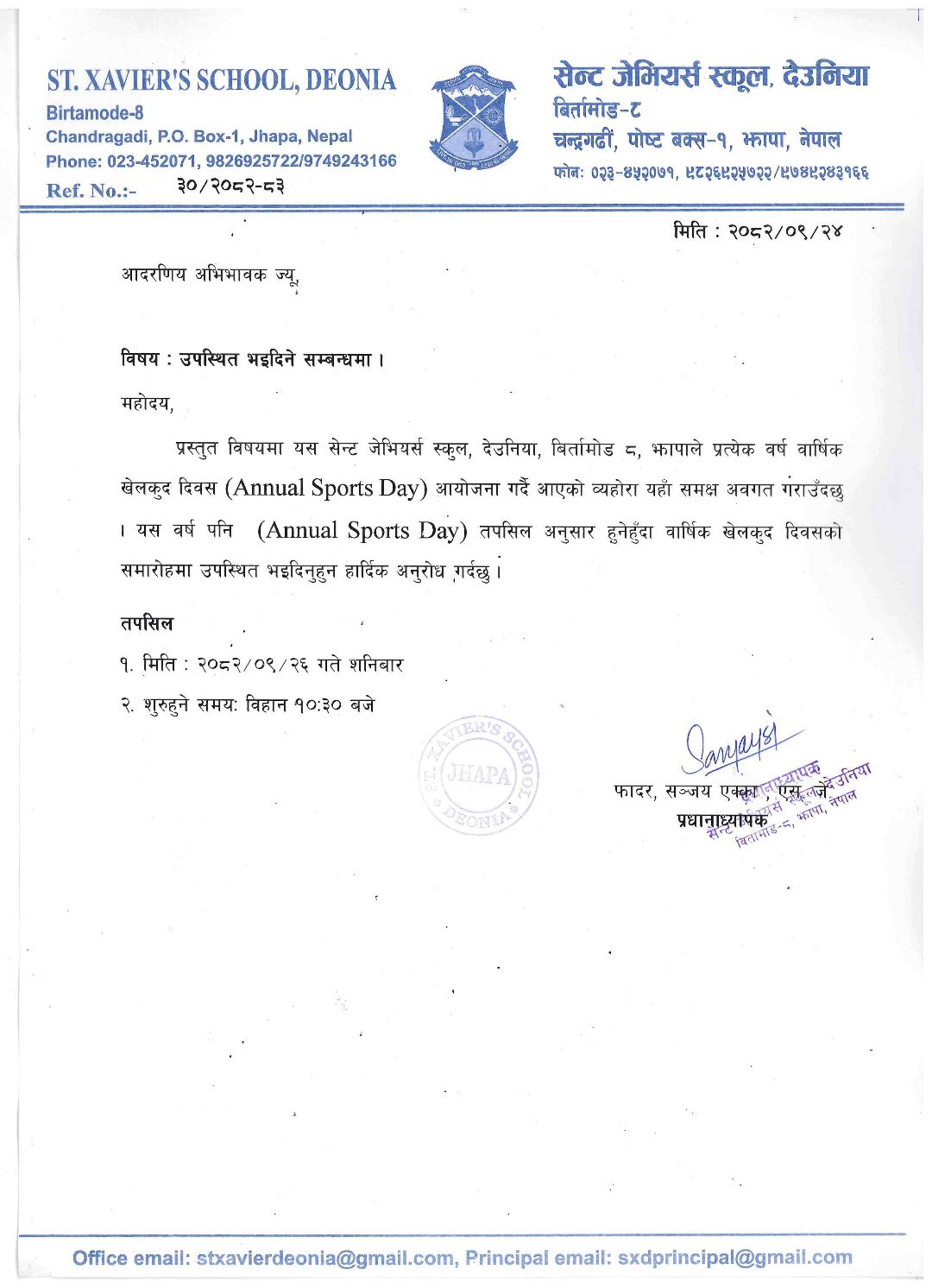Code of Conduct, Shared Values and Principles
Code of Conduct
RULES OF DISCIPLINE AND CODE OF CONDUCT
We try to create in St. Xavier’s Deonia school a just community where people:
- Are safe and secure
- Love and take care of themselves and each other,
- Work, play and rest,
- Protect the environment and create beauty and
- Are gifted and succeed in thinking and learning.
So we expect the children to
- Treat other people, buildings and properties with respect
- Use quiet voices
- Avoid negative physical contact
- Walk gently when it is not necessary to run.
- Avoid teasing, ribbing, and “playing”.
The following rules will help us to create a just community for all involved in the school:
- Students should present a neat appearance at all times. The school uniform must be worn with dignity for all classes and school functions. A student not properly dressed may be excluded from the classroom.
- Since the students are to conduct themselves as gentlemen/ladies at all times, there should be no running, shouting, pushing, playing of games, or throwing of objects in the school buildings.
- Students must care for their own possessions and the school & public property.
Students should not bring costly things, mobiles and other electronic gadgets, to school. If the item is brought, it will be confiscated and will be returned only after one year. The school will not be responsible for lost articles.
Students must not scratch or make marks on the school desks or deface school property in any way. If any damage is done to the school property, the property will have to be replaced at the student’s expense. Any damage should be reported at once to the Vice-Principal or Principal. - Students should remember that their conduct both inside and outside of school determines the reputation of the school. Students are expected to conduct themselves in a decorous manner within and outside the school. Such conduct is based on respect for the freedom, rights, beliefs and dignity of other persons.
- No student shall behave in a disrespectful and discourteous manner with the teachers, staff or fellow students. When the students go on any school outing, they are to follow the instructions the teacher gives.
- Students found harassing/ragging/bullying other students or exhibiting socially unacceptable behaviour will be rusticated.
- If a student experiences any form of abuse, harassment or bullying in the school or outside, they can directly approach the Child Safeguarding Officer, Principal, or Vice-Principals and report to them. Their grievances will be taken seriously, and appropriate action will be taken to address the situation.
- Students are responsible for maintaining the cleanliness of the school premises by not littering. They are expected to make use of the dustbins to keep the classrooms, corridors and premises clean and healthy.
- Our school is a polybag-free zone. Students are expected to use environmentally friendly bags to carry things to school.
- Eating in the classroom is strictly prohibited. Students are expected to avoid junk food. Any packaged food must be brought in a tiffin, not in the packages.
- Whenever a remark is written in the diary, students must get it signed by their parents/guardians and show it to the teacher concerned the very next class day.
- Students are not allowed to use the school telephone without the permission of the Vice-Principal’s office in charge.
- The first bell for class or study is the signal to begin to move towards the classroom. The second bell is for the beginning of the lesson.
- Absolute silence is to be observed from the beginning of the meditation until the students return to the classes after the assembly.
- All are expected to speak good/correct English in school. Nepali may be spoken during the Nepali class. 10. Strict regularity and punctuality, implicit to obedience and courtesy in words and deeds, are expected from every student.
- The school reserves the right to dismiss students whose progress in studies is unsatisfactory or whose conduct is harmful to other students or whose guardians show little or no interest in the progress of their wards. Irregular attendance, habitual lack of interest in schoolwork, immorality, disrespectful behavior, stealing, misconduct even outside the school premises, and willful repeated breaches of school regulations are sufficient reasons for immediate dismissal. 12. Students who are having serious disciplinary or behavioral problems may be asked to do community service within the school or outside the school. If it is outside the school, parents are responsible for making the necessary arrangements.
- Students are expected to use social media and the internet wisely and as per the laws governing them. Any type of abusive/defamatory/inflammatory, or negative use of the media will lead to disciplinary actions. In case of such incidents, the disciplinary committee of the school may access the accounts of the students concerned with the permission of their parents. (“व्यक्तिको अनुमति बिना कुनै पनि प्रकारको तस्बिर लिन र सामाजिक सञ्जालमा प्रकाशन गर्न, व्यक्तिलाई जानकारी नै नदिई सम्बन्धित व्यक्तिको अनुमति र सहमति बिना कुनै पनि प्रकारको भिडियोग्राफी गरी सामाजिक सञ्जालहरुमा प्रकाशन गर्ने क्रियाकलापमा संलग्न जोसुकैलाई प्रचलित कानुन बमोजिम कारबाही हुने व्यहोरा सम्बन्धित सबैमा जानकारीको लागि अनुरोध छ । भनी नेपाल सरकार गृह मन्त्रालयले मिति २०७८/१०/१३ गते जारी गरिएको निर्देशनलाई यस विद्यालयले निर्देशन गम्भीरताका साथ लिई विद्यालयमा लागु गरेको छ ।”)
- A student who uses unfair means and receives or gives assistance in any form during tests/examinations may be dismissed.
- Smoking, drinking alcoholic beverages, the use of drugs and gambling of any kind are forbidden on the school premises at all times. If caught, the students will be dismissed from the school immediately. Chewing gum is prohibited in the school compound and on the school bus. The school also prohibits all types of energy drinks, carbonated drinks and pan masalas.
- Students’ first loyalty is to their school. Hence, students will not join sports clubs or give their names to play on another team without consulting the Principal.
- No student is allowed to leave the school compound without the permission of the Principal/Vice-Principal.
- Since the school library provides a good amount of reading material for the students, they are not permitted to bring any other book, magazine or newspaper to school. They are allowed to bring only their school books.
- No collection of money for any purpose is to be taken up and no meetings, demonstrations, parties, or picnics may be held without the previous permission of the Principal.
- Students using School bus facilities must behave properly in the bus, and irregularity will lead to cancellation of the bus service.
- Failure to observe the school rules will be punished according to the seriousness of the offence and as per the revised disciplinary process. Students who habitually violate the school rules will be asked to leave the school.
- Students are prohibited from riding a motorcycle or scooter as it is illegal. Breaching this rule will make students liable to either a fine and/or rustication from the school.
- Students are restricted from entering hotels, restaurants, cinema halls, parks or shopping malls in school uniform. If a student is found breaching this rule, serious disciplinary actions will be taken against him/her; he/she could even be rusticated from the school.
- Students are not allowed to bunk classes. If a student bunks classes/they will be warned, fined, or even rusticated from the school.
YOUR EDUCATIONAL CHARTER
Good education is a process that brings about desirable growth in a student-growth or change that one is able to see from year to year and evaluate. There are various kinds of growth that must take place:
- Gaining new knowledge about objects, persons, and events.
- Understanding past knowledge more fully and using that knowledge in new ways.
- Developing new skills or improving old ones, e.g., speaking and writing in English/Nepali, and engaging in creative arts.
- Finding new interests and forming good habits and values
- Developing interests and hobbies.
- Developing and practising habits such as punctuality, organisation, solving problems by oneself, especially learning to learn by oneself.
- Developing a sense of moral and spiritual values, pride in one’s own country and a desire to help one’s country.
- Developing a concern for others and their needs and rights.
- Developing respect and care for Mother Earth.
As you go through your school year, you should ask yourself whether you have grown in one or more of these areas. To the extent that there is such growth, your education is successful. But in the measure in which such growth is absent, your education is a failure.
FEE PAYMENT
- Parents are encouraged to deposit fees in the bank a/c of the school. However, the fee can be paid in cash at the school office, and a receipt will be issued. Cheques will not be accepted. Bills are ordinarily prepared for every Nepali month. Parents are asked to make payment before the specified deadline given on the bill.
- Parents/guardians are expected to pay the fees by the deadline.
- Repeated failures to pay fees will result in a written warning, and the child’s name may be struck off the rolls for any nonpayment thereafter.
SCHOOL UNIFORM
The proper School uniform must be worn on all class days and for all school functions and school-related activities. Ornaments and jewellery are not allowed in the school.
For Boys: White shirt, dark blue full pants with black leather shoes, dark blue socks and school tie from class VI. Boys should have their hair cut short and well-combed. Low hip pants and narrow trouser bottoms are not allowed.
For Girls: White shirt, dark blue skirt (Two inches below the knee), Long white (cotton) chemise, and dark blue or black bloomers should be worn at all times with black shoes, dark blue socks, white ribbon and school tie from class VI. Hair is to be long and worn in two plaits without any fashionable hairdo.
On Fridays and activity days, all are expected to wear their house dress.
In cooler weather, students in classes 1-5 must wear dark blue full-sleeved sweaters. Students of classes 6-10 must wear blazers over their sweaters. Only navy-blue colour woollen caps and mufflers are allowed.
After Bratabandha, boys may wear a Nepali Topi. No other caps are allowed.
It is mandatory for students to wear their ID cards on the bus and school premises at all times.
RECOMMENDATION TO PARENTS
In order to achieve all that is best in the education of your child, the maximum cooperation between parents and school staff is necessary. We earnestly ask that parents or guardians look into their child’s school diary every day and see to it that the lessons and homework assigned for the next day are done. The child should be encouraged to cultivate neatness. Remarks made in the diary should be read and countersigned immediately. The students must show their diary to the staff member who made the comment on the next day.
Private tuition is strongly discouraged. If there is a real need for a private tutor, arrange for one after conferring with the Principal. No tuition may be taken from a teacher who teaches the students’ class at school.
Criticism of the children’s teachers or their school in their presence should be studiously avoided because it causes the children to lose respect for their teachers and results in failure to learn from them. Should you have a complaint, please see the Principal.
As your children grow older in age, guide them to become resourceful and useful members of their homes and country. Encourage them to do things for themselves, especially work and study. They should be taught to keep their rooms tidy, make their own beds, polish their own shoes and carry their own bags. The formation of such habits early in life inculcates in them the idea of the dignity of work, a fundamental personal virtue necessary for a successful career in life.
Withdrawal of your child from class for any family, social function is strongly discouraged. It hinders the child’s progress in school and undermines his/her respect for regular hard work, with consequent failure to make progress in his/her studies.
School business is transacted during school hours. In real emergencies, please make enquiries in person or by phone during office hours.
Students cannot be called from the class to meet visitors or to accept phone calls.
CAUTION
- Parents should not use any sort of threat, force or political influence against the school administration for their own advantage.
- Parents should not use any threat, force or political influence against the school administration for their own advantage.
- We are very concerned about the safety of your children and try our best to make the school a safe place for them to be. Due to unavoidable circumstances, if any accident happens in the school compound or on the bus, we hope that the parents will be understanding.
GENERAL HINTS FOR STUDYING
- Take up first the subject you most dislike; once you have done this, the rest of your work will be easy.
- Do not hesitate to ask your teacher or your companions about matters you do not grasp clearly. Never leave difficulties unanswered, as this will later put you into greater difficulties.
- To make sure that you have understood something thoroughly, use these “tricks”:
Pretend that you are explaining the lesson to another and see if you can do it well;
Make yourself your own teacher; question yourself and answer honestly. - Get enough exercise every day. It keeps the mind fresh.
- Do not cut down on necessary sleep in order to study. It will damage your health later on.
- Always complete the lesson or homework assigned. If you don’t, it is like missing a bus that you will have difficulty catching later.
- Revise the work done in class daily. Make sure that you understand everything clearly and thoroughly.
- If memory work is assigned, study it just before going to bed and repeat it first thing in the morning.
- Always write down in your diary the work that is assigned for the next day.
- Make a daily timetable for yourself-for studies, for resting, and recreation. In this way, you will become a person of regular habits, a most valuable asset for life.
- Revise at the end of the week all that was learned during the week.
- Pray to the all-wise and all-knowing God to help you make progress in your studies.
LEAVE OF ABSENCE
- Every absence (sick leave or otherwise) must be entered briefly in ink in the ABSENCE AND LEAVE RECORD pages toward the end of this diary and signed by the parents/guardians.
- No one who is late or has been absent on the previous day will be admitted to class without the principal’s signature in the diary.
- Leave is not granted except on prior written application from parents/ guardians and only for serious reasons.
- If a student is absent from school for any reason whatsoever, the parent should phone the school office between 08:30 A.M. – 09:00 A.M. on the day of the student’s absence.
- For leave up to two days, it is sufficient to apply through the pages of the school diary.
- For leave or absence of more than two days, an application letter must be sent along with the entry of the same in the diary.
- Repeated absence without leave or unexplained absence for more than three consecutive days renders the student liable to have his/her name struck off the rolls. Re-admission, if granted, will be done on payment of the re-admission fee.
- It is mandatory for all to attend class on the opening day after each vacation. Those absent without leave because of sickness must present a medical certificate before they are admitted to class.
- The intended withdrawal of a pupil should be known to the Principal in writing, one month in advance.
- Students’ attendance must meet the criteria of NEB, which is 75% of the total working days.
NORMS FOR PROMOTION
- Promotion is granted on the basis of the whole year’s work; hence, the importance of regularity in work and performance in the examination.
- The final examination will be a comprehensive examination covering the whole year’s content (unless otherwise mentioned).
- To be promoted, a minimum of 35% in theory and 40% in practice in each subject is required.
- In addition to the above requirements, a student’s behaviour and progress are taken into consideration while promoting.
- A student is allowed to repeat only once in a class and twice during his/her school life.
- A student who is weak in major subjects may not be promoted.
- It will not be possible to reconsider the results declared or to hold a re-test.
- The decision of the school authorities with regard to promotion is final.
ACADEMIC POLICIES
Daily Study and Homework
Daily study is expected from all students. Students are given home assignments on a regular, daily basis. These assignments will vary in length, but students should dedicate thirty to forty minutes to each subject every evening. The students should, therefore, expect to spend about three hours on home assignments.
Monthly Objective
The school will select one objective and will strive to achieve it during the month. Honesty, respectfulness, cleanliness, punctuality, obedience, eco-friendliness, self-confidence, discipline, generosity, helpfulness, leadership, neatness, responsibility, and curiosity are some of the examples for the monthly objectives.
Academic Integrity
The St. Xavier’s community expects academic honesty and integrity in all its students. The members of the St. Xavier’s community, both faculty and students, will assume the responsibility for their own learning and honestly demonstrate the breadth and depth of that learning.
The educational program at St. Xavier’s stresses not only the acquisition of skills and knowledge but also the formation of moral consciousness. Students explore the ethical and moral implications of many issues, yet no issue is more important for exploration than the student’s own individual honesty and integrity.
PICTURE OF A XAVIERIAN
- He/She is always friendly to others in and out of School.
- He/She avoids vulgarity in his/her talk and behaviour. He/She never calls other names, no matter what anybody may call him/her.
- He / She accepts whatever work is assigned to him/her as his/her rightful share.
- He/She is always ready to lend a helping hand at home to his/her parents, brothers and sisters, in school to his/her teachers and companions and to any unattended visitors he/she happens to meet in the school premises.
- He/She rises when any teacher or visitor enters or passes through any room or place where he/she happens to be.
- He/She never quarrels or is unfair at play.
- He/she is courteous to a sports person of the opposing team and with officials.
- He/She is always truthful, whatever the cost is.
- He/she is never cruel. He/She will not cause pain. He/She knows cruelty is the trait of a bully, while kindness is the mark of a gentleman/lady.
- He/She is never makes fun of the old or the poor, no matter how decrepit or unfortunate they may be; neither will he/she make fun of a companion because of a misfortune or handicap which he/she cannot help, for he/she knows God’s hand rests lovingly on all these people.
- He/She respects the sports articles, the library and the rights of other children using them.
- He/She respects the beauty of his/her classroom and of the school premises, and reports any damage he/she may do or notice.
- He/She learns and observes good manners at the table and elsewhere.
- He/She never hesitates to say “NO” when asked or tempted to do a thing which he/she knows to be wrong.
- Instead of lamenting and grumbling over the evils of this world, he/she tries to contribute his/her share in making the world a better place to live in and Nepal a real Zone of Peace.
- He/She will keep the environment clean by effectively using dustbins and acquiring pro-Common Home behaviours.
LIBRARY RULES FOR ISSUING BOOKS
- Students are allowed to issue any book for the duration of a cycle (6 days) only.
- Students can issue 2 books, and teachers can issue 4 books at a time.
- Library books can be reissued 3 times.
- Students are allowed to issue any course book for a month. (Class 11-12)
- A course book can be re-issued once only.
- If a student wants to reissue the same book, it can be reissued after submitting it to the library for the duration of a cycle.
- If any book is found damaged while returning, the borrower must pay for it.
- If the students fail to return books on time, a fine of Rs. 5 will be added per day to their account (office account).



